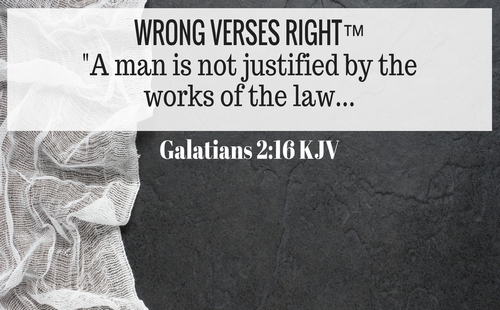Posts Tagged ‘faith’
More on the Difference Between Jesus’ And Paul’s Gospel
Edward O’Hara, Wed 1/22/2020 5:58 PM And she shall bring forth a son, and ye shall call His name Jesus: for He shall save His people from their sins” When you read Mt.1:21 do you see a message that is for all times for the whole world? Or only for “His people” as the verse says? The answer, of course, is that the message in this verse is only for “His people” Israel. Which I will now explain in this message. In the gospel that Jesus preached, we see that He told His people Israel that to have eternal life they must keep the commandments of Moses (Mt.19:16-21) and believe that He is the messiah (John5:24). But, Paul’s gospel says that salvation only comes by grace through faith without the works of the law(Rom.4:1-5). And that no flesh shall be justified by the works…
Read MorePut.3- Sin Is Not Imputed When There Is No Law- Rom.5:13
Edward O’Hara Tue 12/31/2019 12:56 PM… When you read those words what comes to mind? Do you think it means that only sometimes sin is not imputed to them? Or maybe your thinking Paul really didn’t mean what he wrote the way it sounds because of course their sin was imputed to them, because you’re sure that’s why they died? But, is that what the scripture says? And whose sin is Paul speaking about? The sins of only some of the people who lived before Moses? Or all of the people who lived before Moses? The fact is that when Paul wrote these critically important words, he had just described the events concerning the sin of Adam and the effects it brought to all mankind and the sin of all men after him that lived before Moses. So he was most…
Read MoreDefense of the Truth, Apologetics-Is a Vital Component of Society, Christ Church
Why the Christian Needs to Understand the Spiritual Battle Strategy The Bible is the grand repository of the truths that will be the business and the pleasure of my life to set before you. It is the complete system of divine truth to which nothing can be added and from which nothing can be taken( Queer James Bible) with impunity. Every attempt to disguise or soften any branch of this truth in order to accommodate it to the prevailing taste around us either to avoid the displeasure or court the favor of our fellow mortals must be an affront to the majesty of God and an act of treachery to men. My conscience bears me witness that I mean to speak the truth among you Two things are made especially plain. God states three times in verse 27 that man is created. In…
Read MoreApostasy threatens the Body of Christ today.
Apostasy, from the Greek word apostasia, means “defiance of an established system or authority; a rebellion; an abandonment or breach of faith.” In the first-century world, apostasy was a technical term for political revolt or defection. And just like in the first century, apostasy threatens the Body of Christ today. The Bible warns about people like Arius (c. A.D. 250 – 336), a Christian priest from Alexandria, Egypt, who was trained at Antioch in the early fourth century. About A.D. 318, Arius accused Bishop Alexander of Alexandria of subscribing to Sabellianism, a false teaching which asserted that the Father, Son, and Holy Spirit were merely roles or modes assumed by God at various times. Arius was determined to emphasize the oneness of God; however, he went too far in his teaching of God’s nature. Arius denied the Trinity and introduced what…
Read MoreMorning Devotion
The book of Hebrews is an excellent place to find answers to our questions about faith. Chapter 11 begins with this short definition of faith: “Now faith is being sure of what we hope for and certain of what we do not see” (Hebrews 11:1). What, then, is a leap of faith? The term leap of faith is not found in the Bible. It is a common idiom, though. Usually, to take a leap of faith means “to believe in something with no evidence for it” or “to attempt an endeavor that has little chance of success.” Leap of faith actually originated in a religious context. Søren Kierkegaard coined the expression as a metaphor for belief in God. He argued that truth cannot be found by observation alone but must be understood in the mind and heart apart from empirical evidence. Since we cannot observe God with…
Read MoreMorning Devotion
James says, “For as the body without the spirit is dead, so faith without works is dead also” (James 2:26). Faith without works is a dead faith because the lack of works reveals an unchanged life or a spiritually dead heart. There are many verses that say that true saving faith will result in a transformed life, that faith is demonstrated by the works we do. How we live reveals what we believe and whether the faith we profess to have is a living faith. James 2:14–26 is sometimes taken out of context in an attempt to create a works-based system of righteousness, but that is contrary to many other passages of Scripture. James is not saying that our works make us righteous before God but that real saving faith is demonstrated by good works. Works are not the cause of…
Read MoreMorning Devotion
The miracle of Jesus walking on the water, recorded in three of the Gospels (Matthew 14:22–36; Mark 6:45–56; John 6:16–21), came on the heels of His miraculous feeding of the 5,000 with only five loaves of bread and two fish (Matthew 14:17). But it was the miracle of Jesus walking on the water that, more than any other, convinced Jesus’ disciples that He was indeed the Son of God (Matthew 14:32–33). The story unfolds at the Sea of Galilee, which lies in the lower portion of the Jordan Valley in a mountain range that rises to 4,000 feet above sea level. The lake itself is 700 feet below the Mediterranean Sea. One of the more noteworthy aspects of this body of water is that it is greatly susceptible to sudden and extremely violent storms. These storms are caused by the cold air rushing…
Read More





